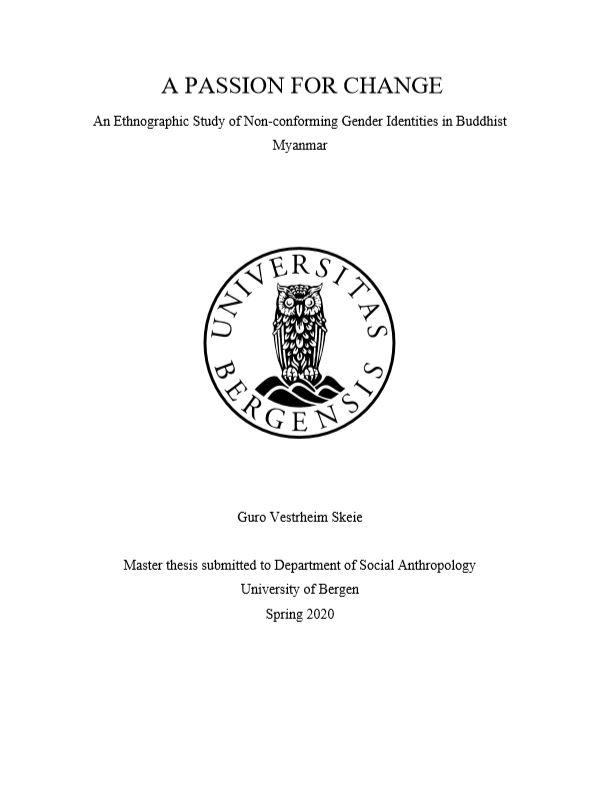A PASSION FOR CHANGE: An ethnographic study of non-conforming gender identities in Buddhist Myanmar
Hovedinnhold
Master's thesis submitted at Department of Social Anthropology, spring 2020.
By: Guro Vestrheim Skeie
Supervisor: Professor Olaf Smedal
This is an ethnographic account of non-conforming gender identities’ performances, relatedness, and relative social standings in the urban sphere of Yangon, Myanmar. The LGBT (Lesbian, Gay, Bisexual and Transgender) community in Yangon was my point of departure for understanding how gendered differences in Myanmar are enacted, and the socio-cultural and emotional constraints that shape gender performances in different contexts. As a country transitioning from a military regime towards democracy, traditional understandings of gender are in convergence with the recent introduction of global identities and information flows. In this thesis I aim to investigate the regulating structures, ideologies, and modes, that figures important to Myanmar gender minorities’ orientation toward autonomy and attachment.
The social life in Myanmar is structured by the formative ideals of autonomy and attachment, Ward Keeler proposes in his monograph “Traffic in Hierarchy: Masculinity and its other in Buddhist Burma” (2017). As social ideals, men are expected to be autonomous, while women are expected to attach themselves to powerful or autonomous others. By following Louis Dumont’s value theory (1980), I utilize Keeler’s value proposal to understand individual and collective wishes for liberation and belonging, according to Buddhist key values structuring the social life in Yangon. While the ultimate holders and representations of autonomy is the Buddhist monks, one of few work lines available to Burmese trans women, involves laying oneself open for possession, which can be interpreted as a complete lack of autonomy. Through my ethnography, I will show that both males and females express behaviours that contradict the values of autonomy and attachment, and that femininity and masculinity functions as means of orientation for reaching these ideals. Females cut off their hair to escape household chores imposed on them, while males refrain from letting their hair grow to ensure attachment to their household.
Although I make use of the global LGBT terms, connecting the LGBT+ subjects in Yangon to the global queer communities, this thesis does not have a gay culture at its locus. Rather, I will elaborate and explore the structural conditions connected to LGBT+ subjects' sociality, as well as the moral and religious ideologies these individuals are integrated in.
